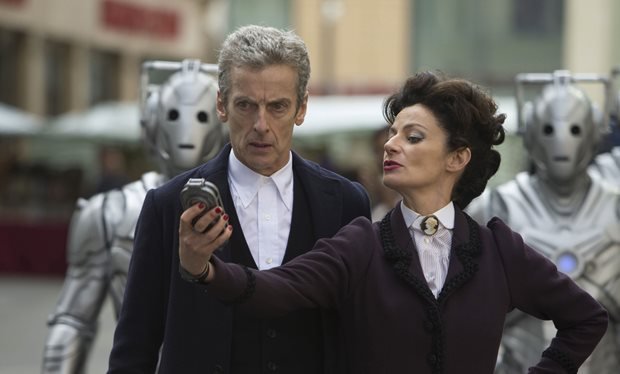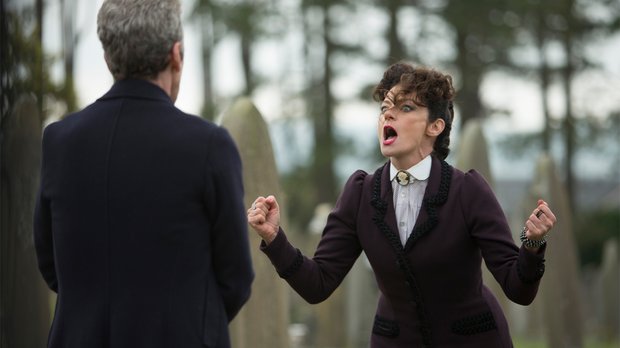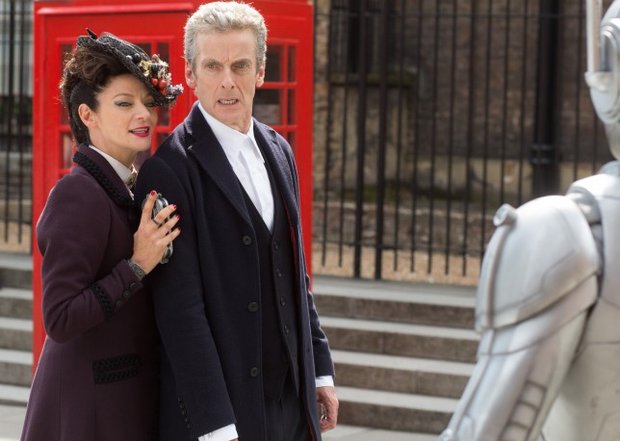The Doctor and Missy are your friends divorced parents
It was a lot easier to be a Time Lord back in the days of Classic Who. The good guys were good, the bad guys were bad, and everyone knew the difference. Of course, it was a lot easier to be a kid back in the days of Classic Who, too; people didn’t have computers, let alone the internet, so the world was a smaller and more understandable place. Today’s young Whovians grew up with the internet in their pockets, and are far more savvy about how the world really works, so the show has made some smart changes to stay relatable. The Doctor sonics his companions’ cell phones so that they don’t face roaming charges on Mars, Cybermen enslave humanity by manipulating their constant need to be online, and politicians are found to be aliens more often than not. It’s all very current and recognizable, but one of The Doctor’s most enduring relationships is the one that’s changed the most to appeal to a modern audience. Whereas once The Doctor and The Master were superhero and nemesis, now they’re more like your friend’s divorced parents.

Back during the days of Classic Who, The Master was pretty clearly A Villain, right down to his perfectly-trimmed goatee and penchant for dressing all in black. He was Terribly Evil and did Terribly Evil things, and always managed to slip away before The Doctor could make him pay for it - not that we ever really wanted him to, anyway. We wanted The Master to pop up again when we least expected it, scare us with just how truly bad he could be, and then vanish with a laugh and a twirl of his moustache. But that kind of simplicity would have a tough time connecting with a modern audience that understands things are rarely so cut and dried, and so they’re given a modern Master, one who’s not entirely good or evil, and whose relationship with The Doctor is, in the words of Facebook, complicated.
The Doctor and The Master have always been oddly connected to each other in New Who. As (they believed) they were the last of their kind, even though they were sworn enemies, there was always a sort of understanding between them - a not-very-hidden longing to be on the same side. The Master’s regeneration as Missy, as well as The Doctor’s into “Eyebrows” has added a new layer to that coexistence, as the two more openly acknowledge their bond. No, they won’t be going on vacation together anytime soon, but their connection is obvious and not entirely unwelcome. Much like your pal’s divorced parents, they’re at each other’s throats one minute and helping each other the next. It’s a smart dynamic for a show that’s been gaining in mass appeal; 42% of marriages in England and Wales end in divorce, according to recent statistics, with that number slightly higher in the US. When Missy and The Doctor start sparring, we recognize their tactics, even if they’re trading barbs about mass murder rather than mortgages.

When you’ve known someone for a long time - and in their case, it’s a long, long time - you can’t help but feel connected to them. That bond is naturally stronger when you have a child together, of course, and in the case of Missy and The Doctor, that child is the universe. As is so often the case with divorced parents, the kid ends up in the middle, something to be argued over and protected, loved and forgotten. Missy and The Doctor end up fighting each other so fervently that sometimes the thing they’re arguing about is incidental; it’s the conflict that makes them feel comfortable. They’re not friends, but they also can’t bear to completely abandon each other, so they fall back on the one thing they feel safe doing: fighting.
Admittedly, few couples end up actually trying to kill each other, but you have to wonder what Missy would genuinely do if given the chance to bump off The Doctor once and for all. She went to a great deal of trouble to help him on Skaro, even saving his beloved Clara more than once. Sure, she tried to trick him into killing Clara, but she didn’t try all that hard. And after he realized what she was trying, he let Missy just walk away - which she did, throwing one last quip over her shoulder. He had a gun, but they both knew he wouldn’t use it, and not because he’s opposed to killing. It’s because, deep down, he wants her around, the same way she wants him around.

It’s a way of interacting that will be immediately recognizable to huge swaths of the audience, and may even help them better understand the complexities of adult relationships. Families are complicated things, and navigating them can be extremely confusing when you’re growing up. Seeing The Doctor and Missy spin and fume and fight, and sometimes do really awful things, and yet still back each other up at the end of the day (because let’s be honest, if Missy was in trouble, real trouble, The Doctor would find some excuse to bail her out), could offer some insight and comfort.
Detractors brush off The Master’s transformation into Missy as a token effort to appease an audience becoming more vocal about wanting to see a woman Doctor, and it very well may be, but it’s also a great opportunity for the show to explore the Gallifreyan duo’s relationship in a new and modern way. Watching Peter Capaldi and Michelle Gomez banter, it’s easy to believe they’ve reached that point of intimacy where love and hate are meshed into one big emotional blob that defies sense and is so very, very recognizable. Good science fiction entertains us as it helps us figure out our own tiny slice of the world; Missy and The Doctor’s malicious affection adds some much-needed truth that New Who’s been missing.
Weekly digests, tales from the communities you love, and more
Susan was once Managing Editor US at GamesRadar, but has since gone on to become a skilled freelance journalist, editor, producer, and content manager. She is now 1/3 of @Continuepod, 1/2 of @BeastiesLl, co-founder of @TakeThisOrg, and Apex Editor, Fluid Group.



